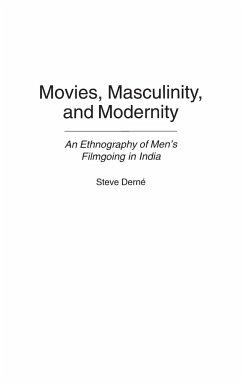Men in India are attracted to Hindi films partly because of their attraction to depictions of modern lifestyles. Dern^D'e argues that films help men handle their ambivalence about modernity by rooting their sense of Indianness in women's acceptance of traditional food habits, clothing, and gender subordination. The book is one of the first ethnographic studies of filmgoing and one of the first to focus on mainstream male audiences. Dern^D'e considers the effects of films' eroticization of domination and submission on men's sexuality. The study provides ethnographic support for Mulvey's argument that filmgoing prompts men to make women the object of a controlling look. The book shows how films invent new ideologies of male dominance by associating Indianness with limitations on women's movements, and by portraying men as rational and modern, and women as emotional and traditional. One of the first ethnographic studies of filmgoing and one of the first to focus on mainstream male audiences, the book contributes to a rethinking of some key arguments in media studies. While media studies have rightly focused on how films prompt men to gaze at women, this study shows that films simultaneously encourage men to see themselves as the object of controlling looks. Dern^D'e exposes as one-sided the scholarly emphasis on how Indians value hierarchy and group guidance, asserting that Indian films instead celebrate individualism and love.
Hinweis: Dieser Artikel kann nur an eine deutsche Lieferadresse ausgeliefert werden.
Hinweis: Dieser Artikel kann nur an eine deutsche Lieferadresse ausgeliefert werden.








